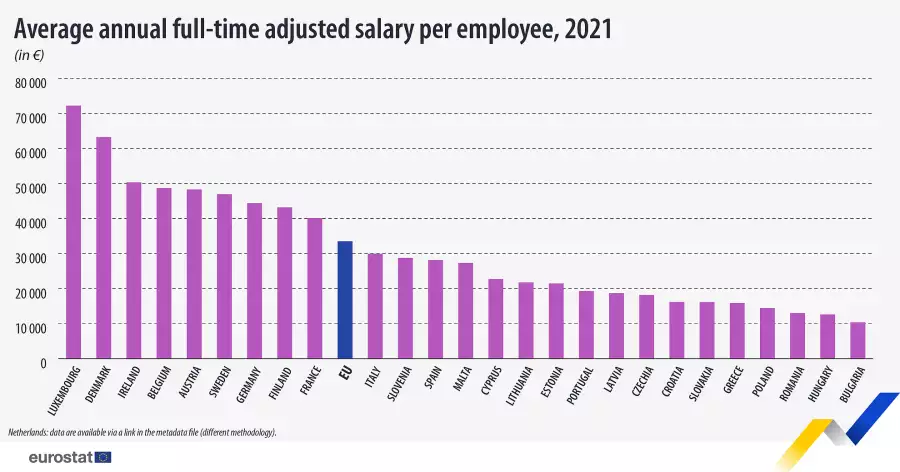Change language:
Awkward: Only Bulgarians earn less than Hungarians in the EU

Average wages in the EU were more than EUR 30,000 last year, according to a new Eurostat indicator. Hungary is ahead of only Bulgaria in the ranking. This means that the country is the second worst performing EU member in this regard.
According to Eurostat, the statistical office of the European Union, the annual adjusted average wage of full-time workers in the EU was EUR 33,500 (HUF 13.5 million) in 2021. This indicator has been published by Eurostat for the first time. The “adjustment” refers to the inclusion of part-time salaries in the indicator, in such a way that it is adjusted to full-time working hours, napi.hu writes.
Hungary could only overtake Bulgaria
Among the EU Member States, the highest annual adjusted average full-time equivalent wage in 2021 was in Luxembourg (EUR 72 200), with Denmark (EUR 63 300) and Ireland (EUR 50 300) making up the podium. The lowest average wages were found in Bulgaria (EUR 10 300), Hungary (EUR 12 600) and Romania (EUR 13 000).
The Hungarian figure of EUR 12,600 at the exchange rate of 403 forints on Tuesday morning is HUF 423,000 a month. As the data series relates to 2021, and last year the exchange rate against the euro was typically between 350 and 370 forints, the average wage would be only HUF 378,000 at an exchange rate of 360 forints, napi.hu writes.
2021’s average annual full-time salary in the EU

Data of Hungarian Central Statistical Office and Eurostat don’t match
According to the Hungarian Central Statistical Office (KSH), in contrast to Eurostat data, average gross earnings reached HUF 438,800 in 2021, while average net earnings reached HUF 291,800 – both up 8.7 percent compared to 2020.
According to the latest data of KSH, the average gross earnings of full-time employees in September 2022 were HUF 504,100, while the average net earnings after taking into account discounts were HUF 347,500. Average gross earnings increased by 17.8 percent and average net earnings by 18.4 percent compared to a year earlier.
Source: napi.hu, Eurostat








Ackward is right- the cost of living in Vienna and Belgium is less than half as much as Hungary. Veery ackward and thy didn’t have e wry thing paid for by the USSR for 40 years.
As far as our Politicians are concerned, as long as there’s not a revolution, the low average wage makes us even more attractive to those wonderful foreign investors they keep on banging on about. With the additional sweetener of European Union funded grants and incentives and or lowest European corporate tax rate, funded by significant social charges and Europe’s highest VAT rate – which is paid by consumers.
In the meantime, lots of talented Hungarians we educated and trained at great expense all seem want to move abroad…
And let’s not forget that Hungary has the highest VAT in Europe, so those low wages are even worse than they look. But don’t worry, Mr. Varga assures us everyting in the economy is just fine and dandy. Please move along. Nothing to see here.